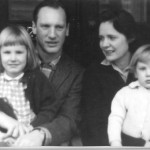 My mom had her first baby in 1957, the peak of the boom. Since day one, I could take for granted that whatever was happening to me was going to be interesting or at least familiar to multitudes. And as a Dr. Spock devotee and nursery school teacher with an MA in early childhood education, my mom was perfectly cast to grow my feeling of specialness, even among the hordes of my equally special peers.
My mom had her first baby in 1957, the peak of the boom. Since day one, I could take for granted that whatever was happening to me was going to be interesting or at least familiar to multitudes. And as a Dr. Spock devotee and nursery school teacher with an MA in early childhood education, my mom was perfectly cast to grow my feeling of specialness, even among the hordes of my equally special peers.
1957 was 57 years ago this year, and as I move through my first Mother’s Day without my mom in the world, I know my loneliness is shared by millions of motherless women and men, boomers and non. For some of us the effect is intensified by missing our dads as well—all access cut to that private family culture of people who get our old jokes and references, and who reliably care about what we think and what we and our kids are doing. What’s the use of a smart-phone if there’s no mom or dad on the other end to savor the photos of my kids that I keep almost sending them?
Though our situations differ somewhat, we boomers have as a common past not just the happy prosperity of the 50s and 60s, but deeper memories of loss inherited through our parents. The children of the depression, the holocaust and the immense suffering of World War 2, our parents’ experience of misery energized their focus on making it new and better for the next generation—for us. Our happy prosperity was built upon a deep sadness about all the parents and loved ones wounded and lost in the decades prior, and if my peers are anything like me in this respect as they are in so many, they too carry a strong sense of the hurt those decades inflicted.
As much as my sadness is my own around my mother’s absence—I miss all the connections we shared over 57 years—I also feel in my memories of her the flood of the sadness she carried, as a WWII refugee who arrived here without her parents at 13. Each of her peers bequeathed to my contemporaries the filtered effects of their own personal hardships.
We feel back through our mothers, to revise Virginia Woolf: both the pain and the joy. A great part of my desire for kids lay in the access they provide me to the happy family culture my parents built for my sister and me and that our new families re-construct as we sing the old songs, cook the old recipes, study, joke and tumble around together in the familiar ways.
We access varying levels of sadness and dysfunction in that inherited culture too, though a great part of my effort is to provide my kids with the means to handle the inevitable sadnesses of human being that will come to them in the special version of their turn. As did our parents for us. Not an easy lesson for the young ones coming up, but one their grandmother and grandfather both modeled with strength and grace. We miss you much and love you forward, Jack and Jackie Gregory.
